-
Welcome to Tacoma World!
You are currently viewing as a guest! To get full-access, you need to register for a FREE account.
As a registered member, you’ll be able to:- Participate in all Tacoma discussion topics
- Communicate privately with other Tacoma owners from around the world
- Post your own photos in our Members Gallery
- Access all special features of the site
engine oil choice at over 200,000 miles?
Discussion in 'Technical Chat' started by Alan in GA, Jan 11, 2012.


 HELP Viper Alarm Systems 500-600 retail but 200-300 on amazon
HELP Viper Alarm Systems 500-600 retail but 200-300 on amazon 75w-85 vs 75w-90
75w-85 vs 75w-90 Heater fan makes noise
Heater fan makes noise A/C making a Growning/Growling Noise; $2,200?!?
A/C making a Growning/Growling Noise; $2,200?!?





































































